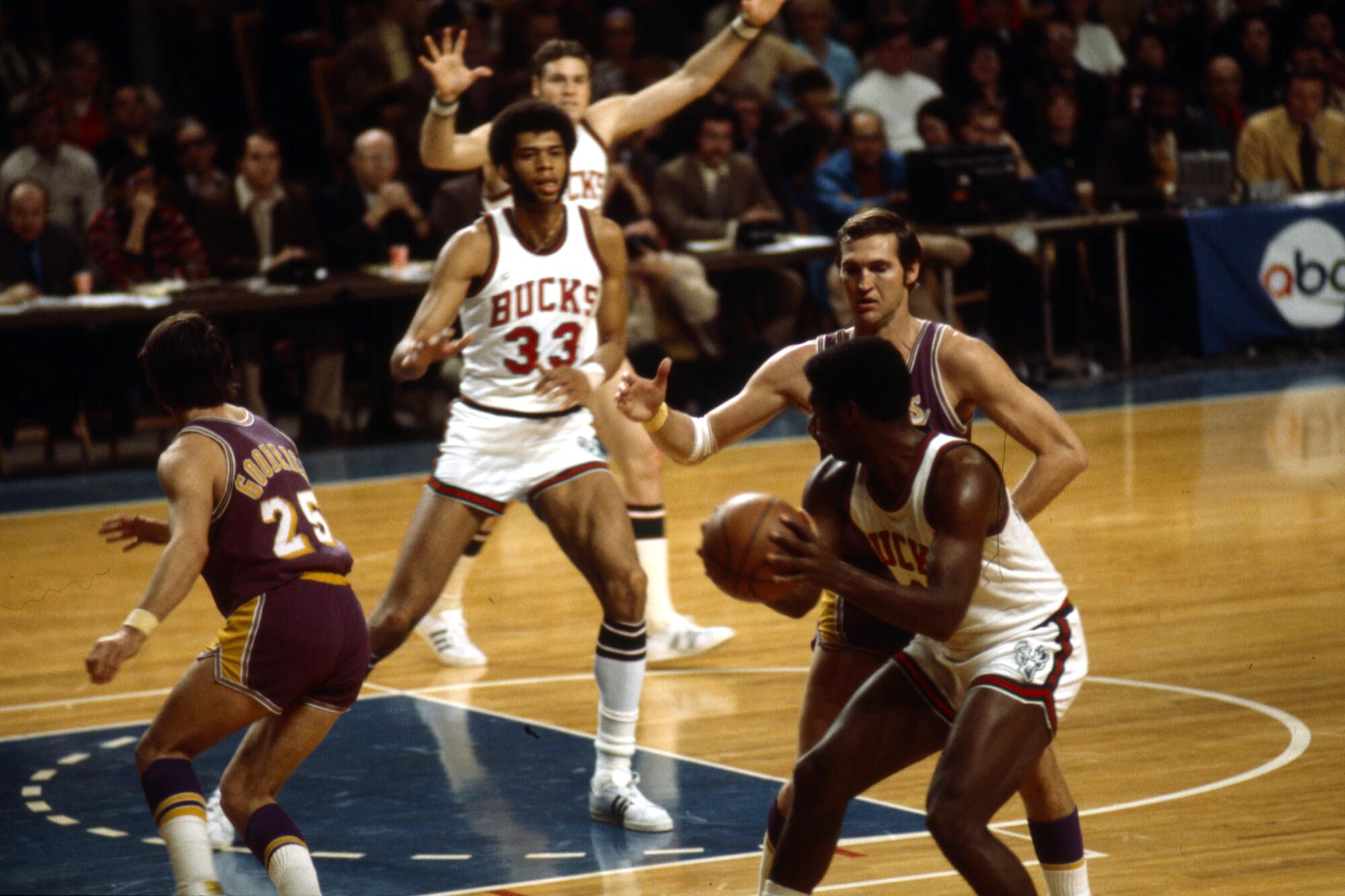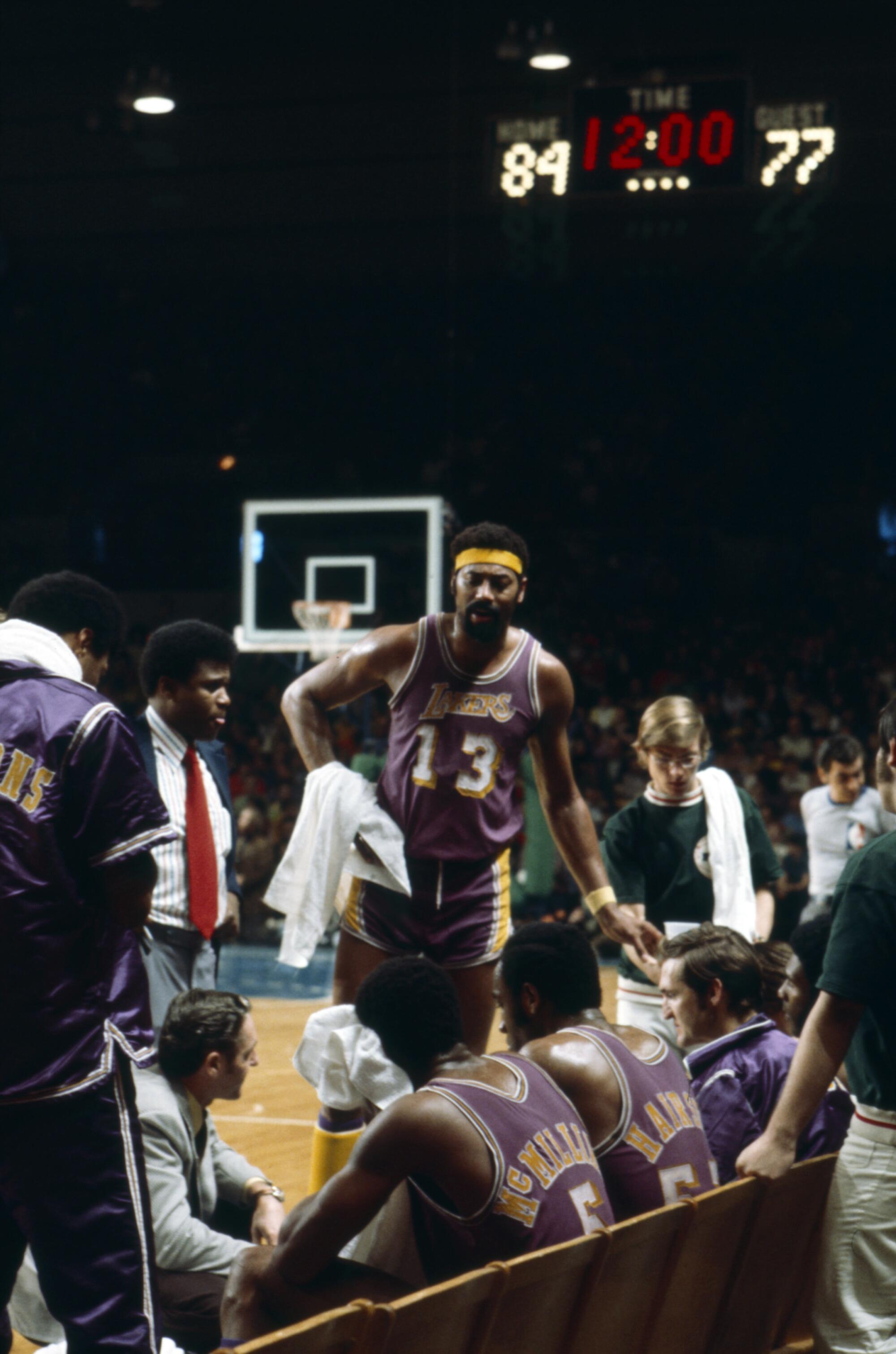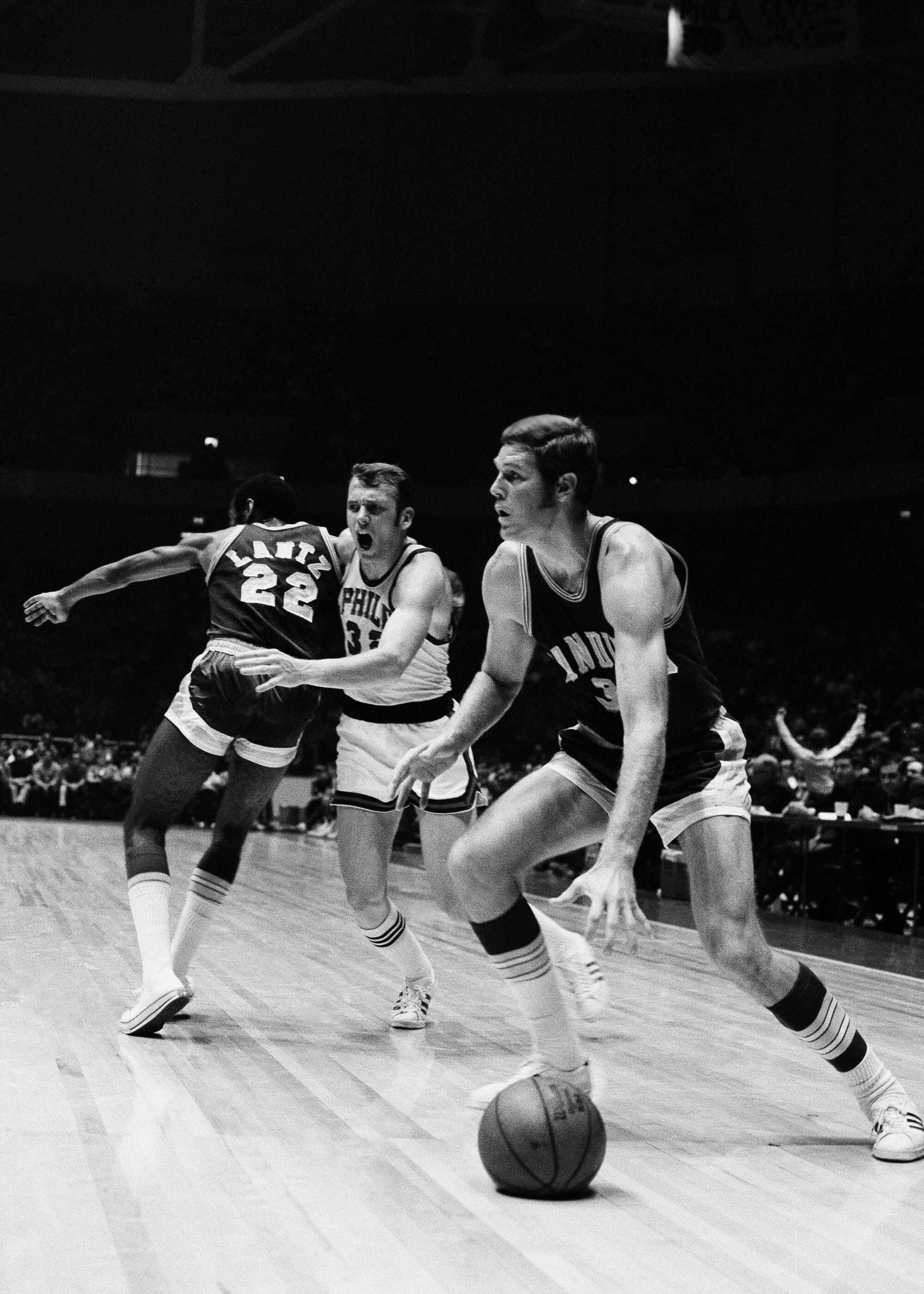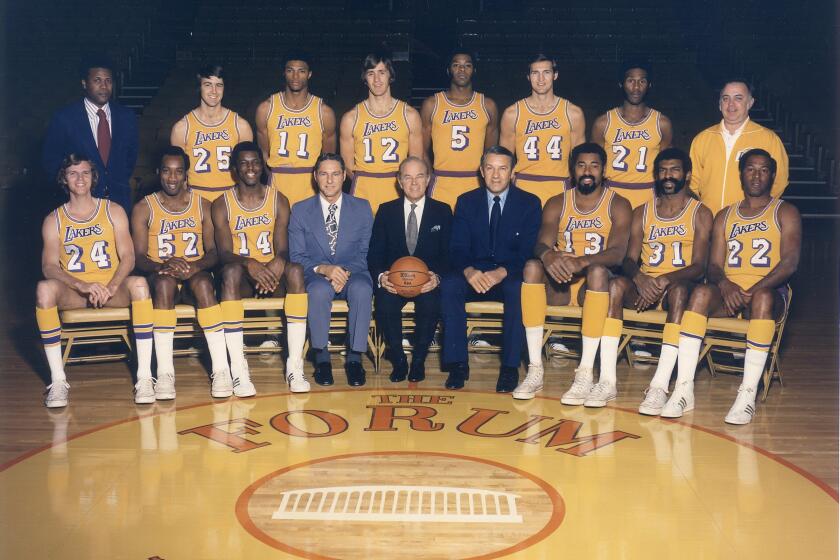
- Share via
John Block was a high school sophomore when the Lakers changed his life for the first time.
It was 1960 and a 16-year-old Block, who had always felt more serious about baseball growing up in Glendale, began to feel a tug toward basketball as the Lakers arrived in Los Angeles from Minneapolis. As Block grew to 6-foot-9 and recruiters took notice, he stayed close to home at Glendale Community College before starring at USC. He had hopes his Pac-8-record scoring and size would be spotted by the franchise of Jerry West and Elgin Baylor.
“That was my desire,” Block said. “I wanted to be in the NBA. And I wanted to play for the Lakers.”
He did, when the Lakers used a 1966 draft pick on a forward who found himself spending his rookie season heeding teammate Rudy LaRusso’s advice to observe West and learn from everything he did, from his practice habits to his tendencies.
Block’s lone season playing for the Lakers is not why strangers sometimes still ask about a game he calls “easily the most memorable” of his 10-year career, one that leads him to sometimes visit YouTube to watch grainy footage called by Keith Jackson and Bill Russell.
That moment is still reserved for his indelible, if largely overlooked, role as a Lakers opponent — helping the Milwaukee Bucks end the Lakers’ NBA-record 33-game winning streak 50 years ago on Jan. 9, 1972.

The streak was finally crushed under the weight of predictably brilliant performances by a pair of future Hall of Famers in Kareem Abdul-Jabbar (39 points, 20 rebounds) and Oscar Robertson (17 points, nine assists), the Bucks’ star duo. Yet that piece of Southern California history was also ended because of the forward whose roots began there. As time has passed, Block has become a footnote to one of the more remarkable games in NBA history but a force to those who lived it.
“A player that I came into the league with … that was sort of the unsung hero was a guy by the name of John Block,” said Pat Riley, who before becoming a Hall of Fame coach and executive was a Lakers guard in 1971-72. “I remember John Block got like 20 points in the game, and even though they had Kareem, that he was a big, big difference-maker in that game.”
His contributions officially stand at 17 points and 10 rebounds, and combined with the 18 points scored in 19 minutes by guard Lucius Allen — whose decorated UCLA career was another L.A. connection to the streak’s undoing — the Bucks’ bench helped finish an effort that had been building for 24 hours, after Milwaukee beat Detroit the night before and finally turned its sights on the Lakers.
“When we left that locker room [after beating Detroit] there was the beginning of the electricity that was going to mount the next day,” Block said. “We were anticipating something that we’re going to be a part of. And I woke up that next morning and I said, ‘Wow, this is just this is going to be some day.’ Didn’t know what that meant, but I knew it was going to be some type of day and so when we walked in the locker room, there was that electricity, just that focus, that there’s no way that the Lakers are going to be able to beat us.
“You get into a zone where just you’re in the right spot at the right time and things just happen. And that was the case for me. It was just, it was one of those games that just flows. It just happens. When I came into that game. I was fired up and ready to go.”
Block had joined Milwaukee months earlier in the offseason following the franchise’s 1971 NBA championship, but his past had prepared him to adjust quickly to a new team headlined by stars.
At community college and USC, Block played for coaches who were among the forerunners of the triangle offense, an experience that made him highly adaptable at reading teammates and playing as a cutter and passer. As a rookie with the Lakers, his teammates included such stars as West and Gail Goodrich, who remained on the roster that arrived in Milwaukee on that January day, and Baylor, whose surprise retirement in the early months of the 1971-72 season immediately preceded the beginning of the streak. And in the four seasons that followed with the San Diego Rockets, Block had treated offensive rebounds like precious treasure while playing alongside scorers such as Elvin Hayes, Stu Lantz and Calvin Murphy.
Most importantly, Block had known Abdul-Jabbar for six years by the time he arrived in Milwaukee. As part of a short-term mission trip sponsored by the church he attended, Hollywood Presbyterian, and Young Life, Block spent the summer of 1965 living in Harlem and playing, often as the only white player, pickup games at famed Rucker Park, where his teammates occasionally included Earl Manigault, the legendary playground player.
For 65 days and 33 games, the Los Angeles Lakers were unbeatable during the 1971-72 season. Here’s a look back at the winning streak 50 years later.
By summer’s end, the church sponsored two New York players to attend school in Los Angeles — one of whom was friends with the then-Lew Alcindor, the best high school player in New York and the country who soon headed west, too, to UCLA. When Block hung out at the student’s apartment on the Hollywood Presbyterian campus, he’d often find Alcindor there, as well. Pickup games followed.
“I had this relationship playing ball, and playing bigger ball, and doing all this stuff with Kareem before I even played against him or anything,” Block said. “So it was an easy flow.”
In the years between their meetings in L.A. and Milwaukee, Alcindor had changed his name but remained the same, dominant presence. His rookie-of-the-year campaign was followed by a second season in 1970-71 that saw him selected the most valuable player of the league and NBA Finals amid Milwaukee’s championship run, the start of a brilliant 20-year career that ended as the league’s all-time leading scorer and a six-time MVP.
But by Jan. 9, Milwaukee had lost four of its previous nine games. Judged against the sheen of the Lakers’ unbeaten November and December, the Bucks “were undeniably left behind — once proud world champions, now by comparison tarnished and brooding giants,” as Sports Illustrated wrote at the time.
“If my memory serves me correctly, it was a game they had kind of circled,” former Lakers guard Jim Cleamons said. “Whether anybody on their side will admit to that, I don’t know.”

There was little doubt, Block admitted. When the Bucks arrived before tipoff, “we walked in and everybody was in the zone,” Block said, a quiet focus soon stoked by a howling home crowd. Not known for his on-court emotions, Block at one point clenched a fist in celebration after making a shot in front of the Lakers bench, a moment captured by a Sports Illustrated photographer.
“You cannot help but just both be really, really fired up,” Block said. “Goodrich and Pat, Keith Erickson — all really good guys that I’d known for years. They were pretty ticked off that I played so well.”
Block had 11 points by halftime, including a basket he’d angled around Wilt Chamberlain after grabbing an offensive rebound over the Lakers’ dominant center. The unexpected nature of his emergence as a factor was heard in the tone of the halftime analysis delivered by Jackson and Russell on the ABC broadcast. As Jackson spun for viewers a carousel decorated with hand-placed names and statistics, the iconic play-by-play announcer dubbed Block a “definite surprise.”
“The reason that the Bucks are ahead, principally, is John Block,” Russell said. “Because the Lakers have not screened him off of the offensive boards. They’ve done a very poor job in that, because you can’t give a guy like that, who is what you call an outside player, in other words he’s sixth or seventh man, if you let him come in and get points, those are points that hurt you.”
En route to the 1972 championship, the Lakers beat Milwaukee in six games in the Western Conference finals, and Block spent the next season in Philadelphia and Kansas City as part of a winding career that was ended by injury in 1976 after 618 games with seven teams. He coached for the next 25 years, at colleges throughout California, drawing from a deep resource of contacts that included Tex Winter.
Block and his wife, Margie, have lived in San Diego for 22 years, and in the last two they have worked together on an autobiography of Block’s life and its propelling influences, faith and basketball. The work has inevitably led Block to pull together the threads of his 77 years. Two involve the Lakers — when he joined them and when he beat them. The memory of the latter is just a click away on YouTube, a 1-hour and 57-minute window into the most memorable game of his life.
“I’ve watched it with some people, actually, and some friends,” Block said. “And my grandboys are getting into the age where I might be watching it with them, again.”
More to Read
All things Lakers, all the time.
Get all the Lakers news you need in Dan Woike's weekly newsletter.
You may occasionally receive promotional content from the Los Angeles Times.








